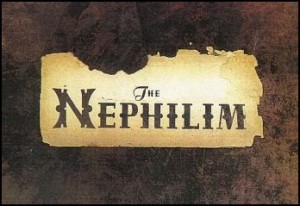The offspring of the sons of God and daughters of men were known as the Nephilim. The word itself is interesting in that in Hebrew it literally means “fallen ones.” It might be a reference to their identity with the fallen angels or it might see them as those God rejecters who fell in the flood which was about to come.  Fallen might refer to the fact that they have been defeated in battle (the word is often used this way) and might be a look ahead to God’s great victory of all who reject and turn from Him. They are described as “heroes of old, men of renown.” These phrases make me think of the last verse of David’s song recorded in the book of Jasher as well as 2 Samuel 1:27. Saul and his army were set on preventing God’s will of David’s leadership over the nation and resorted to violence to stop it. But when he and the army were destroyed and David was made ruler over Judah, David sang. The last verse says, “Oh How the mighty have fallen, and the weapons of war perished!”
Fallen might refer to the fact that they have been defeated in battle (the word is often used this way) and might be a look ahead to God’s great victory of all who reject and turn from Him. They are described as “heroes of old, men of renown.” These phrases make me think of the last verse of David’s song recorded in the book of Jasher as well as 2 Samuel 1:27. Saul and his army were set on preventing God’s will of David’s leadership over the nation and resorted to violence to stop it. But when he and the army were destroyed and David was made ruler over Judah, David sang. The last verse says, “Oh How the mighty have fallen, and the weapons of war perished!”
This opened the door to me for a fresh understanding of the Nephilim. They are the violent warriors that arise to accomplish their wills against the direction of God. They are the offspring of violent unions and all this reinforces the theme of human violence as the primary reason for the flood. The phrase in Hebrew “men of renown” is literally “men of the name.” Kissling rightly observes, “This is the beginning of a repeated wordplay in the Hebrew text which becomes a theme linking the generation which perished in the Flood to the generation of Babel (“Let us make a name for ourselves,” Gen 11:4). They are deliberately contrasted with those who receive a name through God’s promise (“I will make your name great” Gen 12:2). Those who achieve a name by their own efforts perish, while those who trust in God’s promise receive a great and lasting name through God’s grace.”
Many attempt to connect these Nephilim with the Anakim who occupied the land from whom Goliath descended. But the Nephilim were killed in the flood. That they are both referred to as giants might mean nothing more than they both stood out in particular ways, the Anakim by their physical stature, and the Nephilim by their notorious nature. But their “renown” was always based on human standards. They were not those trusting in God’s promise for a great name.
Chuck
“There were giants on the earth in those days…the daughters of men bore children to them. Those were the mighty men who were of old, men of renown.” Genesis 6:4